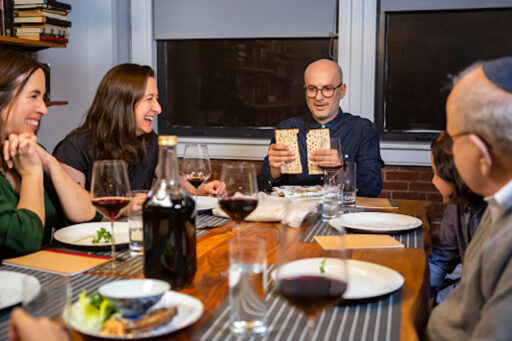As I was reading through Richard Michelson’s new poetry collection, Sleeping as Fast as I Can, recently published by Slant Books, I felt I was reading his memoir. Not in a chronological sense—but because so many of the poems narrate or evoke events in his life. As he says in “Literature of the Body,” “But here I am, quiet / as death, writing my life, and sleeping as fast as I can.”
Key to writing his life is his father’s murder, mentioned in several poems and detailed in one of the book’s three poems titled “Life Sentence”:
A life sentence is what was handed down to the thief
that gunned down your father, my mother said,
her breathing labored, as if by hammering words—tread
and riser—into a flight of stairs, she could climb past grief,
ascending up and out of her own history. Gunned down,
she repeats, for ten dollars and half a tuna sandwich.
Then there’s a long sequence on his mother’s aging and dementia, as in “What My Mother Remembers—Memorial Day,” which begins:
Me, as of today. And my wife, when we’re together. Both kids,
though not whose kids they are. The once bright patterned Picasso
kitchen wallpaper with its slap-dash daubs of blue and yellow.
Mostly she’s haunting her teenaged self. She lowers both eyelids
to better remember a scene, although the plot is long forgotten,
as if her life were God’s first draft, and only random passages
remain.
What an astonishingly apt metaphor for dementia this last clause is.
But most of all, Michelson writes about his Judaism—which is the focus of the first and last of the book’s four Parts. In Part I, he moves from his ancestors (in “Poisoning the Well”)—
…My grandfather abandoned all trivial
delights for Talmudic law; bathing corpses before burial,purging the house of chametz and kashering the oven
each Pesach, while I, feather in hand, dusted for leaven.
—to current events—
as in “In Praise of Disorder”:
Let us praise the rabbis disrupting traffic in front of Trump Tower
to protest the ban on Muslim immigration, all nineteen arrested
for disorderly conduct.…Let us applaud, now, the small disorders; a wine glass set to the left
of the Seder plate, the fork positioned to the far right of the knife,
upsetting expectations and forcing the wrong hand to overreach.
Kudos too, to the fifteen-line sonnet and the sixteen-syllable haiku.
This last line makes me smile, with its “poetic” instances of disorder.
And then there’s the fun of “Lucky Jew Ghazal”:
Jewish prophets have a nose for profit and success.
Contrast your prospects with my needing-rhinoplasty Jews.A rabbit foot, or horseshoe charm won’t cause you any harm,
but each one lacks the ear of G-d, so try my tax-free Jews.Jews are resourceful, clever, kindly; that is why good news
pursues even the socialist or bourgeois Bernie Jews.
I want to pause here to note just a few qualities of Michelson’s poetry: the wordplay in, for instance, “prophets/profit”; his liberal politics (here praising the “disorder” of rabbis protesting Muslim ban, but also expressed in several other of the book’s poems); and also the variety of verse forms throughout the volume. Here above we have a poem in rhymed couplets plus a ghazal. Elsewhere are a villanelle, couplets rhymed or slant-rhymed, many prose poems, and also—most intriguingly—several fourteen-line poems rhymed in sonnet schemes, but neither iambic nor pentameter! An enactment of Michelson’s delight in disorder?
The final Part of Sleeping as Fast as I Can addresses Judaism from a different angle than Part I: now the focus is ritual celebrations and prayers, beginning with a sequence called Eleven Prayers for Passover. (To read these prayer-poems, a familiarity with the Seder—the Passover meal—is necessary, but easily available online.)
Michelson’s Prayer ii, “Prayer Before the Washing of the Hands,” plays off of the ritual purification of handwashing near the start of a Seder. Here’s the whole poem:
I wash my hands of you, my grandmother bellowed,
but I was feeling superior to the gaudy housedress
pattern of her dictates, and her superstitious slippers
so, when the curse caught itself on a protruding screw
of my high school chair where I sat studying Macbeth
and analyzing his Lady, I didn’t even look up. It was
only later, back home, before the dipping of the karpas
when she pointed out the dribble of blood on my finger
that I let her cradle the backs of my hands in her hands
until she could re-balance the weight of transgression
versus virtue, guiding my palms together as if she were
the scholar and I the one praying in front of God’s gate.
After the comically shocking opening (hardly what we expect in a prayer), the poem’s first sentence narrates a scene of hostility between the speaker and his grandmother, having nothing to do with Passover. But the second sentence moves us immediately to the Seder’s early step of “the dipping of the karpas” (a vegetable dipped in saltwater symbolizing tears shed by the Israelites while enslaved in Egypt). And for the rest of this sentence (and the poem), the movements of hands—his grandmother’s and his—enact their reconciliation.
I’ll take just one more of Michelson’s “Eleven Prayers”: number iv., “Prayer Before the Breaking of the Matzo.” This one stays closer to the actual Seder event: from the pile of matsot on a plate, the leader takes one and breaks it in two, wrapping the larger piece (the afikoman) in a napkin and hiding it somewhere for the children to find at the end of the meal. Here’s Michelson’s poem—
And if we must be broken, let us be broken
like the afikoman, that hidden shard of matzo
cherished above the whole. Let us be wrapped
in the soft linen napkin of the Lord’s silence
like pilgrims kneeling on smooth stones
in a Jerusalem gutter, oblivious to the clatter
of the market. Let our children, searching
beneath cushions, call out to claim lost quarters.
Let them ransom us back to the table.
The poem’s opening clause implicitly raises a question: why might we need to “be broken”? But if we must be, it’s to the good—because we’ll be “cherished above the whole.” Then comes the prayer that we be “wrapped” in “the Lord’s silence,” with its lovely simile of pilgrims kneeling on smooth stones, “oblivious to the clatter / of the market.” Finally, two prayers for the children seeking and finding the afikoman—and demanding their reward from the adults.
So I want to close this post with the prayer-term of this poem “Let us… let us….” Let us be grateful for Richard Michelson’s thoughtful, sometimes playful, lovingly crafted poems.… Let us be grateful for poetry.
Peggy Rosenthal has a PhD in English Literature. Her first published book was Words and Values, a close reading of popular language. Since then she has published widely on the spirituality of poetry, in periodicals such as America, The Christian Century, and Image, and in books that can be found here.





